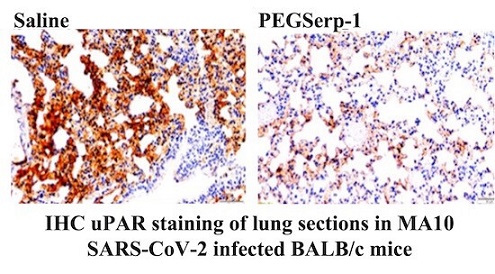Arizona State University Study Finds That Viral Serpin Holds Promise As A Breakthrough Treatment For Severe COVID-19 Infections
Thailand Medical News Team Aug 08, 2023 2 years, 6 months, 2 weeks, 5 days, 5 hours, 25 minutes ago
COVID-19 Research: The world was thrown into turmoil when the novel severe acute respiratory syndrome coronavirus 2 emerged, causing a global pandemic of unprecedented proportions. The virus, responsible for COVID-19, has wreaked havoc, claiming countless lives and overwhelming healthcare systems worldwide. While antiviral drugs and monoclonal antibodies have shown promise in reducing early disease severity, the later stages of infection, characterized by uncontrolled immune responses and coagulopathy, have proved more challenging to manage.
 Synopsis – The study team examined a virus-derived immune modulating serpin, PEGSerp-1, as a treatment for severe viral infection. Later stage inflammatory and coagulation (thrombotic and thrombolytic) pathway activity cause prolonged disease. This is a new class of virus-derived immune-modulating protein biologic
Synopsis – The study team examined a virus-derived immune modulating serpin, PEGSerp-1, as a treatment for severe viral infection. Later stage inflammatory and coagulation (thrombotic and thrombolytic) pathway activity cause prolonged disease. This is a new class of virus-derived immune-modulating protein biologic
In this new study, researchers from Arizona State University embarked on a quest to unveil the potential of a viral-derived serpin, PEGSerp-1, as a game-changing therapy for the devastating late-stage complications of COVID-19.
A Dual Threat: Immune Responses and Coagulopathy in COVID-19
As COVID-19 cases escalated, it became alarmingly clear that the virus's assault on the human body extended far beyond the respiratory system. Severe cases of the disease were associated with a dangerous interplay between excessive immune responses and coagulopathy - a state where blood clotting becomes chaotic and uncontrollable. This deadly combination led to acute respiratory distress syndrome (ARDS), characterized by uncontrolled inflammation, coagulation, and severe lung damage. Mortality rates soared, particularly among patients requiring intensive care unit (ICU) admission.
Unmet Needs and the Promise of PEGSerp-1
In the race to curb the pandemic's devastation, medical researchers focused on early interventions, leaving a critical gap in addressing the later stages of the disease. With mortality rates remaining distressingly high among severe cases and the emergence of "long COVID" - a puzzling condition characterized by persistent symptoms – novel therapeutic strategies were urgently needed. The researchers turned their attention to serine protease inhibitors, or serpins, a class of proteins that play a pivotal role in regulating activated proteases.
The study zoomed in on PEGSerp-1, a serpin derived from the myxoma virus. This viral protein had evolved over millions of years to ward off immune responses from the host organism. PEGSerp-1 stood out as a potential candidate due to its ability to target a spectrum of activated proteases involved in both coagulation and immune responses.
Unlocking the Potential - PEGSerp-1 in Action
The
COVID-19 Research team conducted a series of meticulous experiments using mouse-adapted SARS-CoV-2 models to explore the therapeutic potential of PEGSerp-1. Their findings were nothing short of remarkable. PEGSerp-1 treatment led to significant improvements in clinical scores and weight gain,
offering hope for more effective interventions in the later stages of COVID-19. The treatment's impact extended beyond the lungs, with heart inflammation also showing notable reductions.
Unraveling the Mechanisms - PEGSerp-1's Multi-Pronged Approach
The study team delved into the intricate mechanisms that underlie PEGSerp-1's impressive effects. PEGSerp-1 honed in on the urokinase-type plasminogen activator receptor (uPAR) - a protein linked to both coagulation and immune responses. By targeting uPAR, PEGSerp-1 exhibited a profound ability to modulate inflammation and coagulopathy, mitigating damage to vital organs like the lungs and heart. Additionally, PEGSerp-1's impact extended to the complement cascade, another critical element in the immune response.
Implications for Treatment
The implications of this study are profound. PEGSerp-1 represents a novel class of therapeutic agents capable of recalibrating the intricate balance between immune responses and coagulation pathways. The study underscores the potential of PEGSerp-1 in restoring homeostasis and preventing the damaging consequences of unchecked inflammation and clotting. The development of PEGSerp-1 could pave the way for more effective treatments for severe viral infections beyond COVID-19, offering hope for future outbreaks.
Conclusion
As the battle against the SARS-CoV-2 virus rages on, medical science continues to unearth groundbreaking solutions to combat the devastating effects of COVID-19. The study conducted by Arizona State University researchers shines a light on PEGSerp-1, a viral serpin with immense potential to revolutionize late-stage therapeutic interventions. By targeting both immune responses and coagulopathy, PEGSerp-1 offers a glimmer of hope.
The study findings were published in the peer reviewed journal: EMBO Molecular Medicine.
https://www.embopress.org/doi/full/10.15252/emmm.202317376
For the latest
COVID-19 Research, keep on logging to Thailand Medical News.
